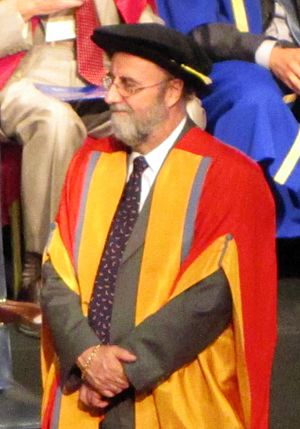Robert Watson (chemist) facts for kids
Quick facts for kids
Robert Watson
|
|
|---|---|
 |
|
| Born | 21 March 1948 (age 77) |
| Nationality | British |
| Alma mater | Queen Mary University of London |
| Awards | Blue Planet Prize (2010) FRS (2011) |
| Scientific career | |
| Fields | Atmospheric scientist |
| Institutions | University of East Anglia |
| Thesis | The study of some reactions involving halogen atoms and oxyhalide free radicals by molecular beam mass spectrometry (1973) |
Sir Robert Tony Watson, born on March 21, 1948, is a British chemist. He has studied important topics like the ozone layer, global warming, and Earth's past climates since the 1980s. Recently, he helped write a big United Nations report called Making Peace with Nature in 2021.
Contents
Education and Awards
Robert Watson earned his PhD in chemistry from Queen Mary College, University of London, in 1973. His studies focused on how gases react in the air, which is called atmospheric chemistry.
He has received many awards for his scientific work. These include the NAS Award for Scientific Reviewing in 1992 and the American Association for the Advancement of Science Award for Scientific Freedom and Responsibility in 1993. The British Government honored him in 2003. In 2014, he received the Champions of the Earth Award from the United Nations Environment Programme. He also became a member of the American Philosophical Society in 2020.
Robert Watson's Career
Watson worked at the National Aeronautics and Space Administration (NASA). There, he was the Director of the Science Division. He was also the Chief Scientist for the "Mission to Planet Earth" program. Later, he worked in the White House as an Associate Director for the Environment.
In 1996, Watson joined the World Bank. He started as a Senior Scientific Advisor. He later became the Director of the Environment Department. Currently, he is the Chief Scientist and Senior Advisor for Sustainable Development at the World Bank. In 2007, he became a professor at the University of East Anglia in the United Kingdom. He also joined the British Government's Department for Environment, Food and Rural Affairs (Defra) as their Chief Scientific Adviser.
Protecting Our Planet
Watson played a key role in efforts to control ozone depletion and global warming. He helped bring different scientific groups together to agree on important findings. This was important for agreements like the Montreal and Vienna conventions. He also helped the Intergovernmental Panel on Climate Change (IPCC) do similar work.
He led the Scientific and Technical Advisory Panel for the Global Environment Facility from 1991 to 1994. He was the Chair of the Intergovernmental Panel on Climate Change (IPCC) from 1997 to 2002. He also co-chaired the Millennium Ecosystem Assessment from 2000 to 2005. From 2005 to 2007, he directed the International Assessment of Agricultural Science and Technology for Development. He also co-chaired the International Scientific Assessment of Stratospheric Ozone reports from 1994 to 2006. He has led or co-led many other international scientific studies.
In 2012, he received the title of Sir from the British government for his service.
Today, he is the Director of Strategic Development for the Tyndall Centre for Climate Change Research at the University of East Anglia. In 2016, Watson was elected Chair of IPBES, an organization that studies biodiversity and ecosystem services.
Robert Watson's Views
Andrew Revkin from the New York Times newspaper described Watson as someone who strongly believes that human actions, like burning coal and oil, are causing global warming. He thinks these actions must change to prevent big environmental problems.
In 2002, the United States government asked for him to be replaced as IPCC chair. Some reports suggested that the oil industry might have been involved in this decision.
In 2000, Watson shared his thoughts on climate change:
- Most scientists agree that human activities are causing climate change.
- Even though there are still some things we don't fully understand, we know that human-caused climate change is happening.
- In recent years, many places have experienced heat waves, floods, droughts, fires, and extreme weather. These events have caused a lot of damage and loss of life.
- While we can't link every single event directly to climate change, we expect these types of events to happen more often and be more severe in a warmer world.
Watson also stated:
- The main question is not if the climate will change because of human actions, but how much it will change, how fast, and where these changes will happen.
- It is clear that climate change will harm many parts of the world. This includes water, farming, forests, fishing, and human communities. It will also affect natural systems like forests and coral reefs, and human health. Developing countries are most at risk.
- The good news is that many experts believe we can greatly reduce greenhouse gas emissions. This can be done using new technologies and policies in energy, agriculture, and forestry.
- Also, we can reduce some of the negative effects of climate change by planning ahead and taking steps to adapt. These ideas come from careful studies by thousands of experts from around the world.
See also

